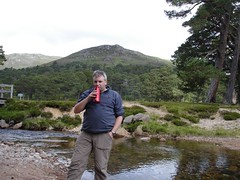I was thinking about the preview of next week's "Landward", and our wonderful countryside access laws in Scotland. People seem quick to blame "wild camping", for example:
The bonnie bonnie banks of Scotland's most iconic loch are in danger of becoming the pongy, pongy banks after an explosion in "wild" camping.
"We followed the path down to the water's edge to let the dog have a swim. On the path were several piles of human faeces with used kitchen roll alongside, no attempt to dispose of it."
The Scotsman 10 Sep 2006
From Scottish Outdoor Access Code (PDF link):
Responsible behaviour by the public
Access rights extend to wild camping. This type of camping is lightweight, done in small numbers and only for two or three nights in any one place. You can camp in this way wherever access rights apply but help to avoid causing problems for local people and land managers by not camping in enclosed fields of crops or farm animals and by keeping well away from buildings, roads or historic structures. Take extra care to avoid disturbing deer stalking or grouse shooting. If you wish to camp close to a house or building, seek the owner’s permission.
Leave no trace by:
- taking away all your litter;
- removing all traces of your tent pitch and of any open fire (follow the guidance for lighting fires);
- not causing any pollution
Although the Act uses the term "lightweight" it doesn't state how light lightweight is. It does, however, state in the Summary that:
Everyone, whatever their age or ability, has access rights established by the Land Reform (Scotland) Act 2003. You only have access rights if you exercise them responsibly.
I'll repeat this last sentence, as it is very important:
You only have access rights if you exercise them responsibly.
The reason it is important is that in the section on responsible behaviour for wild campers, it states that:
You can camp in this way wherever access rights apply
I read this to mean that - if you are not behaving responsible, then you are not a wild camper, and you have no legal right to camp under the Land Reform (Scotland) Act 2003.
So, what is irresponsible behaviour?
2.13 A list of the more obvious statutory offences relating to people’s behaviour is provided at Annex 1. This list includes poaching, vandalism, not clearing up after your dog has fouled in a public place, being responsible for a dog worrying livestock, dropping litter, polluting water, and disturbing wild birds, animals and plants. There are also common law of such as breach of the peace.
3.46 Some types of irresponsible behaviour towards wild birds, animals and plants are an offence under the Wildlife and Countryside Act 1981 and related legislation (see Annex 1 for further details). For example, you must not intentionally disturb specially protected birds while nesting, or their young, and you must not intentionally uproot any wild plant.
There is also responsible behaviour listed for dog owners, when encountering crops, farm animals and near premises at night.
Here is a sample of criminal offences (Annex 1). I've excluded items relating to dogs and vandalism:
- Dropping of litter
Environmental Protection Act 1990 Section 87)
It is an offence to leave litter in any public open place (a place in the open air where you can go without paying). - Lighting fires
Trespass (Scotland) Act 1865 (Section 3)
You are guilty of an offence if you light a fire:- on or near any private road
- on enclosed or cultivated land
- in or near any plantation
- Polluting water
Control of Pollution Act 1974 (Section 31)
If you cause or knowingly permit to enter surface or ground water- Any poisonous, noxious or polluting matter, or
- Any solid waste matter,
My contention is that anyone not having the landowner's permission to drop litter, use growing trees for firewood, light fires (as opposed to stoves), and allows faeces to enter the water system, is not a wild camper. They have lost their rights by not acting responsibly. The landowner can then follow the stated remedies against the person or persons. No-where does the document state that all wildcampers are responsible for the actions of the irresponsible. In fact it states clearly: "Take personal responsibility for your own actions."
If you think that I'm being harsh in my (inexpert) interpretation of the law, here's what Colin Christie wrote in The Journal of the Law Society of Scotland:
If such access is not exercised responsibly as set out in the 2003 Act and the Code, I believe it then becomes a trespass whether it be with civil remedy or an offence under the 1865 or 1994 Act if applicable.
Source: "Access or excess?", The Journal Magazine : The Journal of the Law Society of Scotland, May 2007
For me, I trek under a "leave no trace" policy. I take out my litter and camp with minimal (and hopefully, no) environmental impact. See this TGO leaflet for some more information. The MCoS produce a leaflet, "Wild Camping, A Guide to Good Practice" (link).
 Getting on with my life and thinking about things.
Getting on with my life and thinking about things.










4 comments:
Sensible stuff Dunc.
One of the problems of wild camping is tat - when people try for the first time - they want something relatively obvious and easy.
The "Landward" preview annoyed me, Andy, so I delved into the legal side, and thought, "hmm, this is interesting".
Leave litter behind, and you lose the protection of the law (in Scotland), and open yourself up to being charged.
Of course, it is easier for people to whinge and complain than it is for the Authorities to track down and charge these so-called "wild campers".
So many laws but not enough will to come up with reasonable enforcement strategies. I'm generalising, but what's new.
It's about being responsible, civilized human beings AktoMan
Yup.
Post a Comment